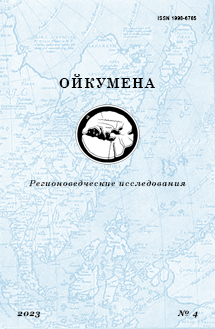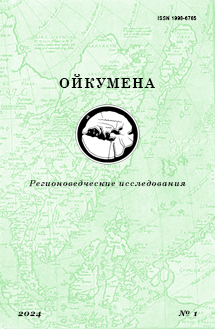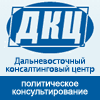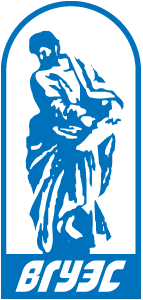Since 2008 the editors initiated the preparation of thematic issues.
|
2023 No.4
The theme:
"Migration and ethnosocial processes in the regions of Siberia and the Russian Far East"
Deadline: October, 16th, 2023
|
2024 No.1
The theme:
"Adaptation of traditional pastoral cultures to the modern cultural environment"
Deadline: January, 16th, 2024
|
 |
 |
|
Abstract Place of residence is one of the main elements influencing the formation and implementation of migration strategies. Features of the sociopolitical space, geographical location, social and economic development of the region, the level of urbanization, the dynamics of ethnosocial processes, and the state of infrastructure can be considered as the main factors influencing the migration sentiments of people. Transformations in the sphere of socio-economic relations are causing noticeable changes in the social well-being of people living in the regions of the Far East and Siberia. Residents are concerned about their difficult financial situation, job search problems, deviations among youth, teenagers, and children, the ability to access quality medical and educational services, safety, etc. Therefore, the question – how to "fix" and attract people to Siberia and the Far East? – remains open. Overcoming the difficulties experienced by residents of Siberia and the Russian Far East is impossible without reliable knowledge about the mechanisms of life of the population of these territories and how exactly they participate in the processes of migration and mobility. These and other questions are planned to consider in the thematic section of the issue. |
Abstract Globalization and regionalization (glocalization), increased social mobility, urbanization and industrial development are today a reality throughout Eurasia. In the face of common modern challenges, the traditional subsistence culture and daily life of pastoral cultures are beginning to change and become more complex. When studying these complex sociocultural, economic and political processes, it is important to identify the degree of preservation and mechanisms of transformation of traditional culture. This problem is significant not only for the classical humanities, but also for modern anthropology, as a scientific direction in the study of human life. Within the framework of this section, it is intended to consider several basic questions: What internal and external processes occur during the transformation of traditional subsistence cultures under the influence of cultural globalization? What algorithms and mechanisms of protective (adaptive) response of traditional subsistence systems appear during urbanization, digitalization and other challenges of our time? What is the role of family relationships and the modern pastoral family in the preservation of traditional knowledge and worldview by an individual (ethnophor) in a situation of collision with a multicultural, multiethnic environment? |
For information on the principles of preparation and processing of materials for submission to the Editor, please, refer to the section «Guidelines».






